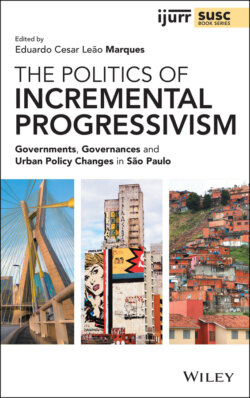The Politics of Incremental Progressivism

Реклама. ООО «ЛитРес», ИНН: 7719571260.
Оглавление
Группа авторов. The Politics of Incremental Progressivism
Table of Contents
List of Tables
List of Illustrations
Guide
Pages
IJURR‐SUSC Published Titles
THE POLITICS OF INCREMENTAL PROGRESSIVISM. Governments, Governances and Urban Policy Changes in São Paulo
Notes on Contributors
List of Abbreviations and Acronyms
Series Editors’ Preface. IJURR Studies in Urban and Social Change Book Series
Acknowledgments
Introduction
Urban Politics and Policies in Urban Studies and Political Science
City Studies, International Comparisons, and Urban Theories
Explaining Urban Policy Change and Capacity Building in São Paulo
Governance and Political Actors Governing São Paulo
The City and Local Brazilian Institutions
The Book
References
Notes
1 Governments, Mayors and Policies
Brazilian Institutions and Municipalities in International Perspective
Electoral Results and the Mayors of São Paulo
Municipal Administrations
Jânio Quadros
Luiza Erundina
Paulo Maluf
Celso Pitta
Marta Suplicy
José Serra and Gilberto Kassab
Fernando Haddad
References
Notes
2 The Politics of Executive‐Legislative Relations
The Production of Governability
Mayors, Political Strategies and Executive‐Legislative Relations
Jânio Quadros (PTB, 1986–1988)
Luiza Erundina (PT, 1989–1992)
Paulo Maluf (PPB, 1993–1996)
Celso Pitta (PPB, 1997–2000)
Marta Suplicy (PT, 2001–2004)
José Serra (PSDB, 2005–2006)/Gilberto Kassab (DEM/PSD, 2006–2012)
Fernando Haddad (PT, 2013–2016)
What Else Do Councilors Do? Territories, Governability and Policy Implementation9
Conclusion
References
Notes
3 The Politics of Municipal Budgets
Analytic Dimensions of Public Budget Governance
Budget Governance in São Paulo Municipality
Final Considerations and Perspectives for a Research Agenda
References
Notes
4 Struggling to Replace the Car Paradigm : Politics and Mobility Change
Institutionalization, Insulation, and Capacitation of the Traffic Sector
The CET: Insulated and Capacitated
The Car Flow Paradigm
Attempts to Deconstruct the Paradigm
Analysis of Changes
Final Considerations
References
Notes
5 Increasingly Governing Bus Services Through Policy Instruments
The Recent Trajectory of Bus Transportation
Governing Opacities in the Transportation Data
Omitting Passengers, Laundering Tickets
The First Electronic Turnstiles
Cards, Validators and Electronic Systems in Bus Services
Conclusion: Progressive Incrementalism in the Bus Services
References
Notes
6 Technocratic Decisions and Financial Arrangements in Subway Services
Line 1‐Blue and the Formation of the São Paulo Subway
Decisions on Line 3‐Red and the Change in the Political Paradigm
The Funding Crisis and Line 2‐Green: Return to the Wealthiest Regions of the City
Line 4‐Yellow and the Entrance of International Actors
The Expansion of Line 5‐Lilac and the Return to the Periphery
Conclusion
References
Notes
7 The Incremental Politics of Waste Management Regulation
Waste Collection in São Paulo's History
The Waste Management Model in São Paulo
Private Companies for Policy Implementation
Conclusions
References
Notes
8 Continuities and Changes in the Diversification of Public Housing
Brazilian Housing Policies Between Local and Federal
Housing Policy in São Paulo
Construction of New Units by Construction Firms
In Situ Slum Upgrading
Irregular Settlement Regularization
Self‐Help Housing Construction
Housing in the Central Area
Conclusion
References
Notes
9 Developers and Politicians in the Institutionalizing of Development Regulation
Definitions and Analytical Framework
Real Estate Interests, Bureaucracies, and the Recent Regulation
Project Trajectories, Bureaucratic Practices, and Regulatory Artifacts
Conclusion
References
Notes
10 Conflicts and Incremental Change in Urban Renewal Instruments
The Beginning of an Urban Regeneration Policy in São Paulo: The Interlinked Operations
The Urban Operations Consortia
Urban Operations Consortia at the Center of the Dispute
Final Considerations
References
Notes
11 Circulation of Institutional Formats in Urban Regeneration : From São Paulo to Porto Maravilha
A Trajectory of Regeneration Projects around Rio's Port
Understanding the Arrangement: The Three Pillars of the Policy
Topics for Comparison: A Historical‐Institutional Approach to the Large Urban Regeneration Projects
Access to Land, Counterpart Instruments and Temporalities
Institutions, Insulation, Private Sector, Political Risk
Political Coordination and Parties
Final Considerations
References
Notes
Conclusion The Political Production of Incremental Progressivism
Multilayer Politics and the Local
The Role of Urban Politics in Policies
State Capacities, Instruments and Policy Processes
Policy Formats and Private Companies
Index
WILEY END USER LICENSE AGREEMENT
Отрывок из книги
The Politics of Incremental Progressivism: Governments, Governances and Urban Policy Changes in São Paulo Eduardo Cesar Leão Marques (ed.)
Youth Urban Worlds: Aesthetic Political Action in Montreal Julie‐Anne Boudreau and Joëlle Rondeau
.....
However, before discussing the policies themselves, it is useful to begin with the distinction between easy and hard redistribution made by Holland and Schneider (2017). This concept sought to explain the limits of the “pink tide” in Latin America in the 2000s, distinguishing widely expanded non‐contributory social benefits (easy) from much rarer labor decommodification policies (hard). In urban contexts, it is reasonable to consider hard redistribution policies as those that influence land values (and thus the wealth of land and homeowners, as well as developers), create zero‐sum games with the wellbeing of elites and the rich, or actively interfere in the interests of private service providers. Easy redistribution involves policies that improve the quality of life of the poor and their access to services but without impacting the wealth of the rich. The case of São Paulo suggests that easy distribution policies may be implemented under any government (although they are usually also first developed under left‐wing administrations), while hard distribution only happens during left‐wing governments.8
With this distinction in mind, we can return to policy production processes. Once decisions are made, policies must be produced and delivered, which brings bureaucrats, private contractors and policy community actors to center‐stage. These actors interact with politicians within policy‐specific governance patterns (Le Galès 2011) and are involved in the production and operation of all policies, irrespective of producing easy or hard redistribution.
.....